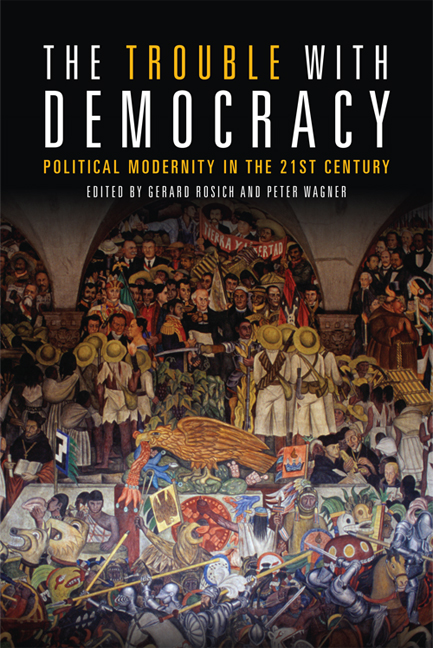Book contents
- Frontmatter
- Contents
- Acknowledgements
- List of Contributors
- 1 Introduction: Re-Interpreting Democracy for Our Time
- 2 Autonomy in and between Polities: Democracy and the Need for Collective Political Selves
- 3 Rethinking ‘Modern’ Democracy: Political Modernity and Constituent Power
- 4 Democratic Surplus and Democracy-in-Failing: On Ancient and Modern Self-Cancellation of Democracy
- 5 Setbacks of Women's Emancipation (Condition, Consequence, Measure and Ruse)
- 6 Political Modernity, Democracy and State–Society Relations in Latin America: A New Socio-Historical Problématique?
- 7 Communitarian Cosmopolitanism: Argentina's Recuperated Factories, Neoliberal Globalisation and Democratic Citizenship. An Arendtian Perspective
- 8 Middle-Classing in Roodepoort: Unexpected Sites of Post-Apartheid ‘Community’
- 9 Democracy and Capitalism in Europe, Brazil and South Africa
- 10 From Realism to Activism: A Critique of Resignation in Political Theory
- 11 The World as We Find It: A Suggestion for a Democratic Theory for Our Times
- 12 Epilogue: Democracy as Capacity for Self-Transformation
- Index
7 - Communitarian Cosmopolitanism: Argentina's Recuperated Factories, Neoliberal Globalisation and Democratic Citizenship. An Arendtian Perspective
Published online by Cambridge University Press: 05 September 2016
- Frontmatter
- Contents
- Acknowledgements
- List of Contributors
- 1 Introduction: Re-Interpreting Democracy for Our Time
- 2 Autonomy in and between Polities: Democracy and the Need for Collective Political Selves
- 3 Rethinking ‘Modern’ Democracy: Political Modernity and Constituent Power
- 4 Democratic Surplus and Democracy-in-Failing: On Ancient and Modern Self-Cancellation of Democracy
- 5 Setbacks of Women's Emancipation (Condition, Consequence, Measure and Ruse)
- 6 Political Modernity, Democracy and State–Society Relations in Latin America: A New Socio-Historical Problématique?
- 7 Communitarian Cosmopolitanism: Argentina's Recuperated Factories, Neoliberal Globalisation and Democratic Citizenship. An Arendtian Perspective
- 8 Middle-Classing in Roodepoort: Unexpected Sites of Post-Apartheid ‘Community’
- 9 Democracy and Capitalism in Europe, Brazil and South Africa
- 10 From Realism to Activism: A Critique of Resignation in Political Theory
- 11 The World as We Find It: A Suggestion for a Democratic Theory for Our Times
- 12 Epilogue: Democracy as Capacity for Self-Transformation
- Index
Summary
When I asked Ricardo why he and some of his co-workers at Ghelco, a food processing plant with fifty or so workers, had decided in early May 2002 in the midst of Argentina's worst socio-economic debacle, to ‘recuperate’ their factory after the owner had filed for bankruptcy and terminated them, he responded:
if we had not done so, we would have been unemployed, and at our age [late 40s to late 50s] it would have been impossible to find another job […] Anyone who is jobless is treated like garbage; look at the Piqueteros […] Restarting the factory enabled me to regain my dignity.
After pressing Ricardo several times to clarify the meaning of this last phrase, he replied:
Whenever I talk to the Piqueteros in my neighborhood, they always tell me that they should have stayed put and recuperated their factory […] All of them are now receiving Planes (welfare relief) from the government, but this makes them feel like shit, like real nobodies […] They lost their place (in public life) the moment they abandoned their factory.
Many of the workers that I interviewed used strikingly similar terms rooted in civic recognition and political belonging to describe their own situation as well as the plight of unemployed Piqueteros who had been stripped of their ‘right to have rights’, to borrow from Hannah Arendt. They were as fearful of losing their jobs as they were of losing their ‘place in the world which is what makes opinions significant and actions effective’.
After the interview I spent the remainder of the afternoon strolling through the neighbourhood of Barracas, where Ghelco is located, on the city's southern edge. Prior to the debacle this area had been one of the most economically vibrant and productive in the country, home to hundreds of workshops and medium-sized factories which provided countless skilled workers with stable, well-remunerated jobs and their children with a sense of security, knowing that someday they would follow in their parents’ footsteps.
- Type
- Chapter
- Information
- The Trouble with DemocracyPolitical Modernity in the 21st Century, pp. 148 - 184Publisher: Edinburgh University PressPrint publication year: 2016



